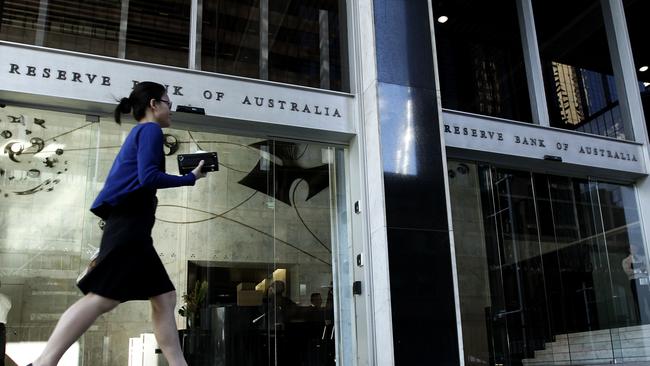No boom, no bust, just mediocrity as Australia muddles through
Australia’s last recession, now 28 years ago, was famously deliberate. The next one will probably be an accident.

Australia’s last recession, now 28 years ago, was famously deliberate, designed to crush three unwanted breakouts — the current account deficit, wages and the property market — through the blunt-force trauma of unemployment.
The next one will probably be an accident — these days central banks do anything to avoid recessions, including negative interest rates and printing money. What’s more, it looks a very long way off.
By the way, that recession in 1991 did the job, of course, but it led quickly to the Reserve Bank getting independence so it wouldn’t happen again.
Ever since then high levels of immigration and a commodity super-cycle, followed by super-low interest rates leading to booms in household leverage and housing construction, and a massive fiscal stimulus, have kept recessions at bay, even as the rest of the world had a whopper in 2008.
So why won’t there be another one for a while? Because there won’t be a boom for a while. Australia’s problem in the 21st century is mediocrity, not extremes of anything.
The causes of the 1991 recession are certainly not an issue now: wages growth and productivity are both sluggish, we have a trade surplus thanks to China and the overheated east coast property market is now deflating thanks to the “macro-prudential” work of APRA.
So with the recession-free world record under our belt, Australia has a synchronised global expansion, rising commodity prices, bipartisan immigration of at least 100,000 a year and a property soft landing. What’s more, low wages growth and inflation will keep interest rates at record lows for at least six months longer, possibly 12.
Everyone agrees that Australia’s GDP growth won’t be much to write home about in the years ahead, but that’s OK. No boom means no recession.
What could possibly go wrong? In a word, debt — it’s 200 per cent of disposable income, and more than 100 per cent of GDP.
But even that may not be a problem. Excessive debt will cause a recession only if one or both of two things rise: interest rates and unemployment, with the latter usually, but not always, following the former. But as discussed, interest rates are going nowhere for some time and unemployment is falling.
Market-based bond yields are rising, which could cause some pain in the commercial asset markets (shares and commercial property), but Australian home mortgages are set against the cash rate, not the bond rate.
And the cash rate is manipulated, not discovered, and, as discussed, the manipulators in Martin Place will do anything to avoid recessions in order to protect their independence from vengeful, arse-covering politicians.
It’s true that nasty surprises are coming for all those property investors who took out two-three year interest-only loans that will need to be renegotiated from this year onwards, with sharp increases in repayments as they move to principal and interest. However, it’s hard to imagine there are so many of those that aggregate demand will take a recession-causing hit as a result.
In any case, the overriding shelter from recession, in my view, is Australia’s dullness.
Economic growth, wages, CPI inflation and asset prices are all likely to remain subdued, possibly for years. Recessions follow booms, either in GDP and consumer prices, or assets — the sharemarket or more often real estate.
But the Australian economy could chug along for years, weighed down with debt, supplier to China of materials, food, education and nice experiences, and paying minimal wage rises — no booms, no recessions, just economic insipidity. That prospect is likely to be reinforced by the world-class mediocrity of our corporate executives.
Last week, Deloitte published a survey of 1600 Australian C-suite executives as part of a global survey about Industry 4.0, the catch-all phrase for AI, big data, internet of things, 3D printing, cloud computing and all that.
Deloitte asked them whether their organisation was ready for it: just 2 per cent said yes, compared with 14 per cent globally. Another question was whether they thought technology was a key differentiator in business these days: 4 per cent said yes, compared with 20 per cent globally.
These results tend to be borne out by discussions your correspondent has with corporate executives and advisers.
It means the great oligopolies on which Australia’s economy has relied for a hundred years are under siege from the global firms that are not just prepared for Industry 4.0 but are leading it, and definitely regard technology as a differentiator.
The only other thing that could possibly go wrong and cause a recession is political incompetence.
The nation’s politicians have been working hard already to engineer an energy-led recession with huge electricity and gas price increases, not to mention actual blackouts and shortages, caused by a decade of policy paralysis.
A federal election is now approaching so fiscal tightening is unlikely to be a danger for a while — in fact we seem to be in for tax cuts and fiscal stimulus instead.
Then there’s the prospect of a wage breakout if/when Labor wins. Bill Shorten touched on this subject in his National Press Club speech this week, asking “Do we accept (that) the slide into insecure work and low wages is inevitable?”
Surely not. But wait … didn’t Labor cause the last recession? The one we had to have?
Alan Kohler is publisher of The Constant Investor


